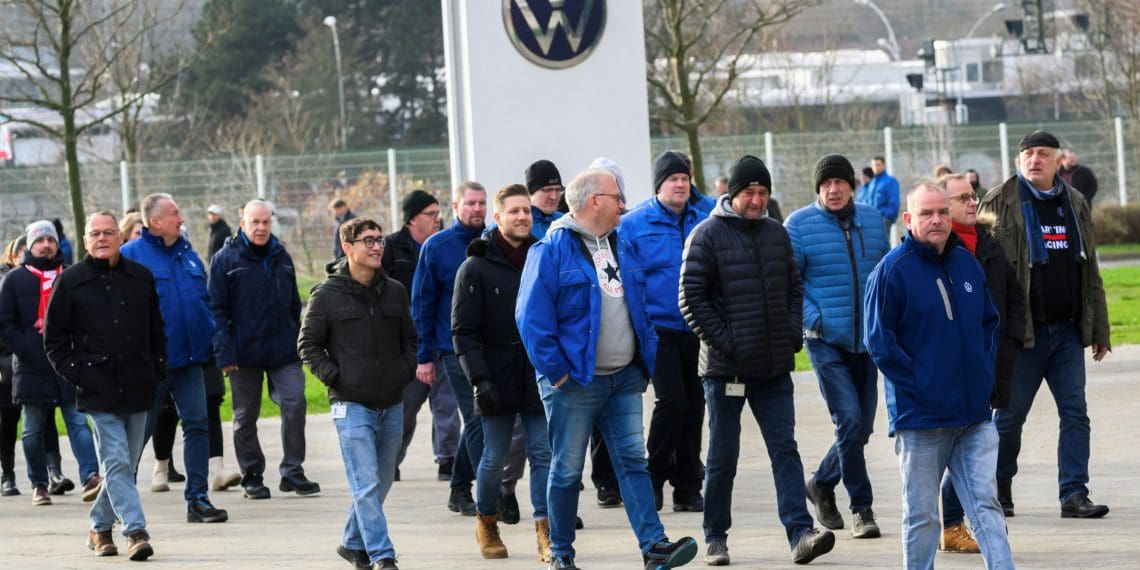Volkswagen, Europe’s largest carmaker, is caught in the crosshairs of a growing worker uprising as strikes intensified across nine German sites on Monday. The industrial action, sparked by ongoing disputes over wage cuts and plant closures, coincides with a pivotal fourth round of negotiations between management and the influential IG Metall union.
Union Fury: Strikes Double in Length Amid Stalemate
Unionized workers, furious over Volkswagen’s proposed cost-cutting measures, staged four-hour walkouts—double the duration of last week’s strikes. The mounting tension underscores the escalating standoff, with unions warning of even harsher action, including 24-hour or indefinite strikes, if their demands are not met.
IG Metall’s chief negotiator, Thorsten Groeger, minced no words during a fiery rally at Volkswagen’s Wolfsburg headquarters:
“Trust has been destroyed… workers are very angry. The VW brand risks becoming damaged, and the share price has plummeted to basement levels. That is the board’s responsibility.”
A Battle for the Future of VW in Germany
The dispute centers on Volkswagen’s push to slash costs and reduce overcapacity in Germany as it faces fierce competition from lower-cost Asian carmakers making inroads into Europe. The automaker has proposed wage reductions and potential factory closures as part of its strategy to stay competitive, drawing sharp criticism from unions and political leaders alike.
Chancellor Olaf Scholz, navigating Germany through political turmoil and an impending snap election, issued a stern warning to VW over the weekend: “Factory closures will not be tolerated.”
Volkswagen’s leadership, however, insists that its measures are vital for survival. CEO Oliver Blume defended the plans, stating:
“We cannot operate in a fantasy world. The fast-changing environment demands difficult but necessary decisions.”
Union Pressure Mounts
Union leaders have accused Volkswagen of prioritizing corporate profits over workers’ livelihoods, with Groeger urging the company to abandon its “maximum positions” during Monday’s talks.
“It’s time for the board to make a move,” Groeger declared. “Otherwise, the strikes will only intensify.”
An IG Metall flyer distributed to workers threatened a grim escalation: “We’ll tighten the thumbscrews until it gets really, really uncomfortable.”
Volkswagen’s Counterargument: A Need for Hard Decisions
Volkswagen’s chief negotiator, Arne Meiswinkel, acknowledged the severity of the situation but stressed that drastic measures are unavoidable:
“Demand for cars in Europe has fallen, and German costs are unsustainable. We must find alternative pathways to address overcapacity and reduce costs.”
The automaker rejected a union proposal as financially unfeasible, signaling a deep divide that may complicate any resolution. Management has remained steadfast, framing the cost-cutting efforts as a necessary evolution to survive in an increasingly competitive market.
Strikes Test the Limits of VW’s Resilience
The strikes come at a critical juncture for Volkswagen, as its domestic operations face mounting financial and competitive pressures. With Germany’s economy in flux and political stability hanging by a thread, the outcome of these negotiations could set a precedent for labor relations across Europe.
Workers are holding firm against wage cuts and plant closures, vowing to ramp up their resistance if necessary. As negotiations unfold, the stakes for Volkswagen, its employees, and the broader German economy couldn’t be higher.
Will Volkswagen yield to worker demands, or will the automaker’s leadership push through its cost-cutting agenda, risking further unrest? The outcome of this battle will shape the future of one of the world’s most iconic carmakers.










